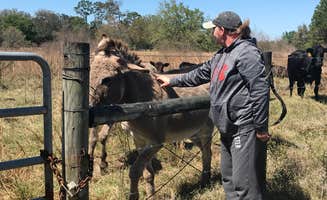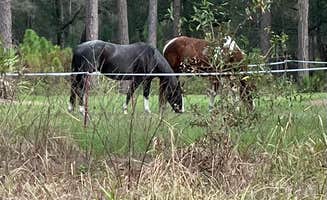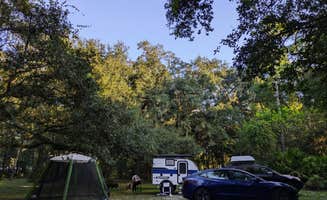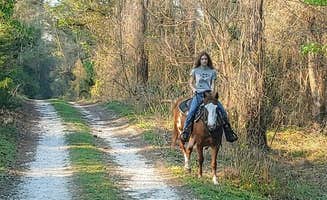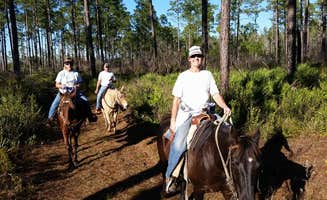Equestrian camping options abound within a 30-mile radius of Spring Hill, Florida, where limestone bedrock creates unique terrain features including small caves and spring-fed waterways. The region's subtropical climate allows for year-round camping, though summer humidity peaks from June through September when temperatures regularly exceed 90°F. Most horse campgrounds maintain dedicated trail systems connecting directly to forest service roads and multi-use paths.
What to Do
Cave exploration: Visit the Withlacoochee State Forest near Holder Mine Campground where limestone caves create unique exploration opportunities. "We met some lovely people here who showed us a great trail you can hike on that brings you to some awesome caves, yes in Florida, that you could explore in," notes Kim S.
Mountain biking: The forest road system at Jay B. Starkey Wilderness Park offers extensive biking options with both paved and off-road trails. "We come out to Starkey all the time, for the hiking and for the on and off road biking," explains Rich S., adding that "The park has a lot to offer, and is a great little spot."
Wildlife viewing: Early morning hikes through Green Swamp West Tract provide excellent wildlife spotting. "The symphony of Sandhill Cranes and Coyotes as the sun set was a memory I'll never forget," writes Kelly S. about her backcountry experience. Visitors commonly report seeing deer, wild turkeys, and occasional bobcats throughout the forest tracts.
What Campers Like
Privacy between sites: Many equestrian campers appreciate the spacious layout at horse campgrounds near Spring Hill, Florida. At Serenova Tract Campsites, Brett D. notes, "Very private, great views and the neighboring campers were very respectful!" The campground's design places sites far enough apart to maintain a sense of solitude.
Proximity to supplies: Unlike remote horse camping areas, Serenova Tract offers convenient access to necessities. "Supermarket and several restaurants just across the main road," mentions Hootmon H., while Curtis D. adds, "Food shopping right across the street, Publix. Also a couple take out places... gas is right next door, Racetrack. Everything else 10 minutes away."
Security features: Gated entry systems provide peace of mind at several horse campgrounds. "The campground is gated so you need a code to get in, which is a nice safety feature," explains Abby M. about her 5-day stay. Most equestrian campgrounds require reservations that include access codes for entry gates.
What You Should Know
Reservation requirements: Most equestrian camping requires advance planning. For Green Swamp West Tract, "You can't beat Green Swamp West for nice and quiet free camping area," says Robert H., but you must secure reservations through Southwest Florida Water Management's website.
Seasonal flooding: Low-lying areas throughout the region can become impassable after heavy rains. Brett D. warns about Serenova, "Be mindful of going after/during a good rain, it floods pretty easily."
Road conditions: Access roads to horse campgrounds often require careful navigation. At Colt Creek State Park, Joe R. notes, "The long and windy ride in gives you a trip back to some real Florida," while Robert M. describes the approach to Tillis Hill: "The 'right' road is a 1 1/2 mile drive on for the most part, smooth limestone... Yes two or three spots with pot holes, but manageable."
Tips for Camping with Families
Cabin options: For families new to equestrian camping, Lake Louisa State Park offers alternative accommodations. "This park has cute little teepees for rent, tent sites, primitive sites, group sites, 20 cabins and even an equestrian campground with stalls and a corral," explains Travyl Couple.
Beginner-friendly trails: Choose less challenging routes for children and novice riders. "The campground connects directly to over 18 miles of trails through the forest," making Starkey Wilderness Park ideal for families. Melanie B. confirms it's "clean, rustic, and has lots of firewood for campers. There are many hiking, bike trails, and 2 playgrounds within mere steps of your tent or cabin."
Educational opportunities: Several parks maintain nature centers with interpretive displays. "This park has separate primitive tent, car-camping (tent) and cabin campgrounds near the entrance of the park along with over 50 miles of biking, hiking, nature as well as equestrian trails to enjoy. Not to mention several parking areas throughout with playgrounds and an educational center make this a favorite for families," notes Steve S.
Tips from RVers
Site selection: RVers should carefully research specific site dimensions before booking at Colt Creek State Park Campground. "Camp spots are big, flat with gravel parking areas. Power and water at each site for RV camping," reports SanDal B., but site sizes vary considerably throughout the region's horse campgrounds.
Dump station availability: Check current status of sanitary facilities before arrival. Todd L. warns about Holder Mine Campground, "The dump station is no longer in use so you have to use the bath house or dump elsewhere," highlighting the importance of verifying amenities before booking.
Power requirements: Most equestrian campgrounds provide electrical hookups with varying amperage. At Tillis Hill, Robert M. notes "20-30-50 power and fresh water at sites. We have a 34' class A and had no issues with trees." However, he cautions, "Some sites are a challenge to level, seems the park was built some time ago and the Earth's shifting has made some uneven."



